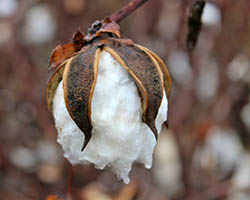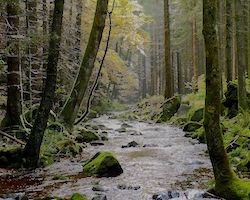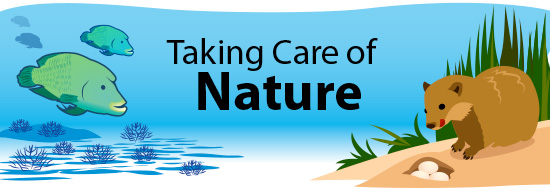The Benefits of Nature
Can you remember the last time you sat under the shade of a big tree to cool off? While you sat there, you might have seen a honeybee buzzing around and pollinating flowers. Maybe the flowers grew into watermelon or bright red tomatoes. From these tiny bees that pollinate our food to huge trees that create cooling shade, humans benefit from nature in many ways.
What Are Ecosystem Services?

The benefits from an area or ecosystem are called ecosystem services. Some ecosystem services are pretty easy to understand, like when streams provide fish for us to eat and cotton plants give us material for our clothes. Others are less obvious, like when trees remove pollutants from the atmosphere or coral reefs protect a coastline from hurricanes.
Human actions, like polluting water or burning fossil fuels, can have negative impacts on ecosystem services. One example of this is deforestation. Trees provide the ecosystem service of storing greenhouse gases, which are gases like carbon dioxide and methane that trap heat from the sun in our atmosphere and contribute to global warming. When deforestation happens and many acres of trees are cut down, more greenhouse gases will go into the atmosphere.
Imagine what life would be like without ecosystem services like these. It would be much more difficult to live without purified water, fruits and vegetables for food, and plants that help scientists make medicine. What ecosystem services can you think of that help you?

In order to preserve our ecosystem services, ecosystem management is an important tool. Humans and nature are strongly connected, and by doing research and creating rules, societies can protect ecosystems and the services they provide people.
For example, one law in the United States called the Clean Water Act controls water pollution. This helps to ensure that people can have access to pure and clean water.
Another way to manage ecosystems is to do long-term research, such as when scientists study plants and animals for many years in a desert ecosystem. These help them understand how changes to an area can affect the ecosystem over longer time scales. Research findings can then be used to create the best strategies and rules possible for both people and ecosystems.
Additional images via Wikimedia Commons. Image of boy drinking by DFID - UK Department for International Development.
Read more about: Taking Care of Nature
Bibliographic details:
- Article: The Benefits of Nature
- Author(s): Dr. Biology
- Publisher: Arizona State University School of Life Sciences Ask A Biologist
- Site name: ASU - Ask A Biologist
- Date published:
- Date accessed:
- Link: https://askabiologist.asu.edu/benefits-nature
APA Style
Dr. Biology. (). The Benefits of Nature. ASU - Ask A Biologist. Retrieved from https://askabiologist.asu.edu/benefits-nature
Chicago Manual of Style
Dr. Biology. "The Benefits of Nature". ASU - Ask A Biologist. . https://askabiologist.asu.edu/benefits-nature
Dr. Biology. "The Benefits of Nature". ASU - Ask A Biologist. . ASU - Ask A Biologist, Web. https://askabiologist.asu.edu/benefits-nature
MLA 2017 Style

Water is an ecosystem service many of us take for granted. However, clean water is not readily available for over one billion people across the globe.
Be Part of
Ask A Biologist
By volunteering, or simply sending us feedback on the site. Scientists, teachers, writers, illustrators, and translators are all important to the program. If you are interested in helping with the website we have a Volunteers page to get the process started.


